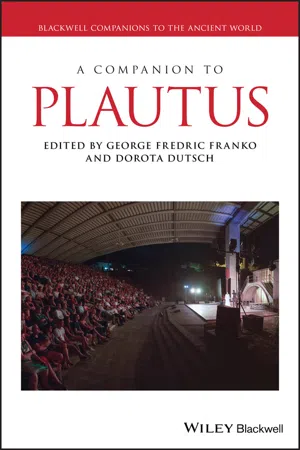
A Companion to Plautus
Dorota Dutsch, George Fredric Franko, Dorota Dutsch, George Fredric Franko
- English
- ePUB (disponibile sull'app)
- Disponibile su iOS e Android
A Companion to Plautus
Dorota Dutsch, George Fredric Franko, Dorota Dutsch, George Fredric Franko
Informazioni sul libro
An important addition to contemporary scholarship on Plautus and Plautine comedy, provides new essays and fresh insights from leading scholars
A Companion to Plautus is a collection of original essays on the celebrated Old Latin period playwright. A brilliant comic poet, Plautus moved beyond writing Latin versions of Greek plays to create a uniquely Roman cultural experience worthy of contemporary scholarship. Contributions by a team of international scholars explore the theatrical background of Roman comedy, the theory and practice of Plautus' dramatic composition, the relation of Plautus' works to Roman social history, and his influence on later dramatists through the centuries.
Responding to renewed modern interest in Plautine studies, the Companion reassesses Plautus' works—plays that are meant to be viewed and experienced—to reveal new meaning and contemporary relevance. Chapters organized thematically offer multiple perspectives on individual plays and enable readers to gain a deeper understanding of Plautus' reflection of, and influence on Roman society. Topics include metatheater and improvisation in Plautus, the textual tradition of Plautus, trends in Plautus Translation, and modern reception in theater and movies. Exploring the place of Plautus and Plautine comedy in the Western comic tradition, the Companion:
- Addresses the most recent trends in the study of Roman comedy
- Features discussions on religion, imperialism, slavery, war, class, gender, and sexuality in Plautus' work
- Highlights recent scholarship on representation of socially vulnerable characters
- Discusses Plautus' work in relation to Roman stages, actors, audience, and culture
- Examines the plot construction, characterization, and comic techniques in Plautus' scripts
Part of the acclaimed Blackwell Companions to the Ancient World series, A Companion to Plautus is an important resource for scholars, instructors, and students of both ancient and modern drama, comparative literature, classics, and history, particularly Roman history.
Domande frequenti
Informazioni
CHAPTER ONE
The State of Roman Theater c. 200 BCE
Sources
- Hoping to appease the gods in response to a plague in 364, Roman leaders introduced to their religious games (ludi) “dancers, summoned from Etruria,” who “performed quite refined dances in the Etruscan manner, without singing or imitating any specific action.” They were accompanied by a tibicen, who played the tibia, a woodwind instrument consisting of two pipes with double reeds (see Chapter 17, pp. 252–253).
- Roman youth imitated these dancers, “at the same time hurling insults at each other with rude verses; and their motions were in agreement with their voices.”
- Professional actors abandoned the rude verses of the Roman youth and introduced more refined versions of this combination of song and dance, which were called saturae.
- Some time later, Livius Andronicus brought plays with plots to Rome.
- Because he lost his voice performing in his own plays, Livius Andronicus introduced a new practice, in which actors vocalized only the spoken parts of the drama. Instead of singing the musical parts, they gestured silently while someone else sang to the accompaniment of the tibia. Not having to sing themselves, the actors could gesture more energetically.
- The youths left these more sophisticated performances to professional actors, “and they themselves began to toss back and forth jokes intermingled with verses, just as they had done in the old days.” These ruder performances became associated with exodia (short performances after regular plays) and with the fabula Atellana, an Oscan performance genre imported into Rome.
A Well‐Established and Cosmopolitan Tradition
Indice dei contenuti
- Cover
- Table of Contents
- Notes on Contributors
- Acknowledgement
- Introduction: A 2020 Vision of Plautus
- CHAPTER ONE: The State of Roman Theater c. 200 BCE
- CHAPTER TWO: Plautus and Greek Drama
- CHAPTER THREE: Stages and Stagecraft
- CHAPTER FOUR: Actors and Audience
- CHAPTER FIVE: Nouo Modo Nouom Aliquid Inuentum: Plautine Priorities
- CHAPTER SIX: Plays of Mistaken Identity
- CHAPTER SEVEN: Plautus and the Marriage Plot
- CHAPTER EIGHT: Stock Characters and Stereotypes
- CHAPTER NINE: The Servus Callidus in Charge: Plays of Deception
- CHAPTER TEN: To Hell and Back: Comedy, Cult, and the House of the Meretrix
- CHAPTER ELEVEN: The Wife in Charge, the Husband Humiliated: Stock Characters in Evolution
- CHAPTER TWELVE: Archetypal Character Studies: Masculinity and Power
- CHAPTER THIRTEEN: Plotting the Romance: Plautus' Rudens, Cistellaria, and Poenulus
- CHAPTER FOURTEEN: Tragicomedy and Paratragedy: Plautusʼs Amphitruo, Captivi, and Rudens
- CHAPTER FIFTEEN: The Language of Plautus
- CHAPTER SIXTEEN: Metatheater and Improvisation in Plautus
- CHAPTER SEVENTEEN: Music and Meter in Plautus
- CHAPTER EIGHTEEN: Comic Technique in Plautus's Asinaria and Casina
- CHAPTER NINETEEN: Plautus and the Topography of His World
- CHAPTER TWENTY: Warfare and Imperialism in and Around Plautus
- CHAPTER TWENTY-ONE: Religion in and Around Plautus
- CHAPTER TWENTY-TWO: Gender and Sexuality in Plautus
- CHAPTER TWENTY-THREE: Owners and Slaves in and Around Plautus
- CHAPTER TWENTY-FOUR: Slave Labor in Plautus
- CHAPTER TWENTY-FIVE: Plautus and His Dramatic Successors in the Republican Period
- CHAPTER TWENTY-SIX: Alii Rhetorica Tongent: Plautus and Public Speech
- CHAPTER TWENTY-SEVEN: The Textual Tradition of Plautus
- CHAPTER TWENTY-EIGHT: The Medieval Reception of Plautus's Aulularia: Querolus and Vitalis Blesensis
- CHAPTER TWENTY-NINE: From Ferrara to Venice: Plautus in Vernacular and Early Italian Comedy (1486–1530)
- CHAPTER THIRTY: Plautus in Early Modern England
- CHAPTER THIRTY-ONE: Reception Today: Theater and Movies
- CHAPTER THIRTY-TWO: Trends in Plautus Translation
- Index
- Index Locorum Plautinorum
- End User License Agreement